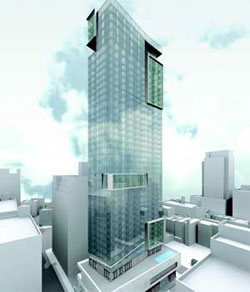Worried About Trump's Manhattan Condo Hotel in Brooklyn
 Not that Donald Trump would be interested in tossing up one of his
Not that Donald Trump would be interested in tossing up one of his Trump's proposal has drawn loud and bitter opposition, particuarly because of the height of the building. But Brooklyn activists are worried that if Trump succeeds in putting up the hotel, then it could spell doom for neighborhoods like Red Hook, Sunset Park and Gowanus. The latest Carroll Gardens Courier provides the details:
Condo hotels are like transient hotels in that they have all the services offered by hotels; they differ distinctly, however, in that the units are owned, not rented for a night or two. Thus, they become second homes or even primary residences for those who buy in, who can also rent out their units – possibly for months at a time — when they are not utilizing them. Condo hotels can be extremely lucrative for those who develop them; an added bonus is that the developer gets money for the units up front, rather than relying on the successions of comings and goings that fuel transient hotel profits.Andrew Berman, the executive director of the Greenwich Village Society for Historic Preservation, calls the decision Trump is seeking "a total Trojan horse" and notes that the decision will, in effect, be made administratively. "It’s a back-door way to get what amounts to a citywide zoning change without any public process," he says.
Faced with the specter of high-rise development in the borough’s remaining manufacturing areas, Brooklyn activists have joined Manhattanites in decrying Trump’s proposal, which some say, would likely bring with it a rush to develop those areas – heretofore out-of-bounds for residential construction – in a way that would bring in luxury housing and squeeze the remaining manufacturing uses, without even a nod to affordable housing.

0 Comments:
Post a Comment
<< Home